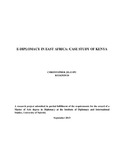E-diplomacy in East Africa: Case Study of Kenya

View/
Date
2013-09Author
Ipu, Christopher J
Type
ThesisLanguage
enMetadata
Show full item recordAbstract
In recent years social media has been increasingly used in many parts of the world. In 2009, it was the essential tool in Iran for the opposition protests to appeal to the support of the world public opinion by helping dissidents plan rallies and spread first-person accounts of the protest movement. Interestingly, in the case of Iran, there were 220,000 tweets an hour, 3,000 YouTube videos, and two million blog posts, many of which became powerful tools for the dissidents to rally international support. Similarly, in 2007 Kenya's post-election violence, the social media was a powerful instrument in creating and spreading hate messages forcing the government to impose a media-blackout in a drastic attempt to control the spread of violence. Social media not only proved to be a powerful medium in influencing the public but also drew the attention of public diplomacy professionals, observers, and political analysts on how it could be positively utilized to enhance a country's image. The research determines the tools used in adopting ICT to cultivate public diplomacy in Kenya, its impact and challenges, and analyzes the successes of adopting ICT into diplomacy in order to ensure efficiency in public participation of government polices and other processes. It adopts the Actor-Network Theory (ANT) as an explanatory framework of analysis. ANT proposes a socio-technical account in which neither social nor technical positions are privileged. It employs both exploratory and descriptive designs where the use of exploratory design was appropriate to establish the state of E-diplomacy in Kenya, while descriptive research determines the frequencies and provides us with a visual on how things are. The responses were processed by use of a computer statistical package for Social Science (SPSS) programme. The research outlines its findings in terms of knowledge and expertise in adopting E-diplomacy in Kenya and the lays out strategies in curbing challenges such as cybercrime which are inter-twined with ICT. It concludes by providing specific recommendations such as sensitization of the general public on positive utilization of the social media to amendment of laws to ensure efficiency and reliability.
Citation
A research project submitted in partial fulfillment of the requirements for the award of a Master of Arts degree in Diplomacy at the Institute of Diplomacy and International Studies, University of Nairobi.Publisher
University of Nairobi Institute of Diplomacy and International Studies,
